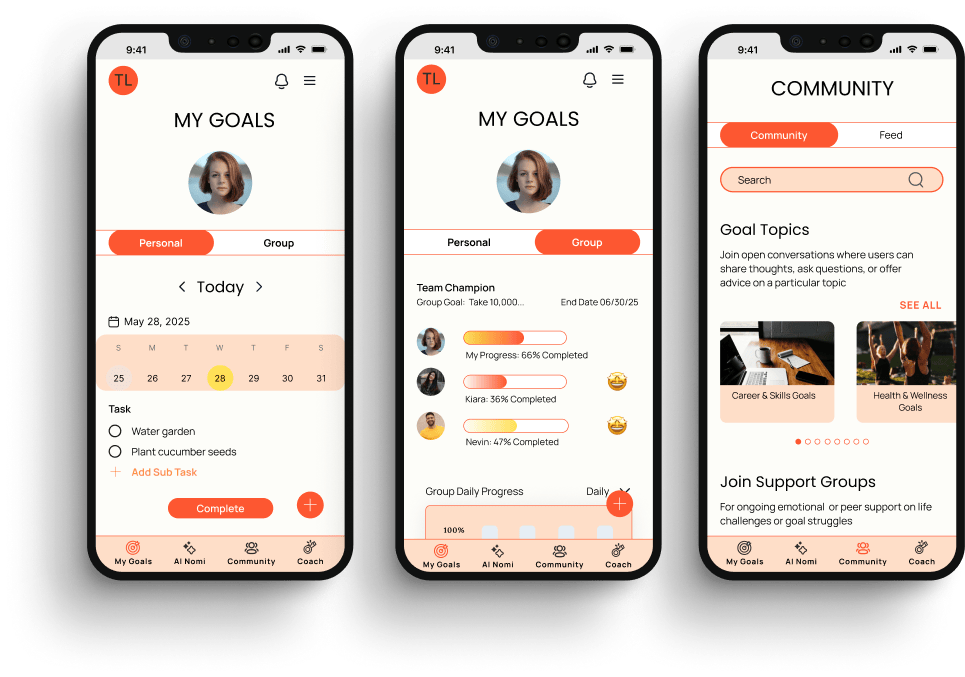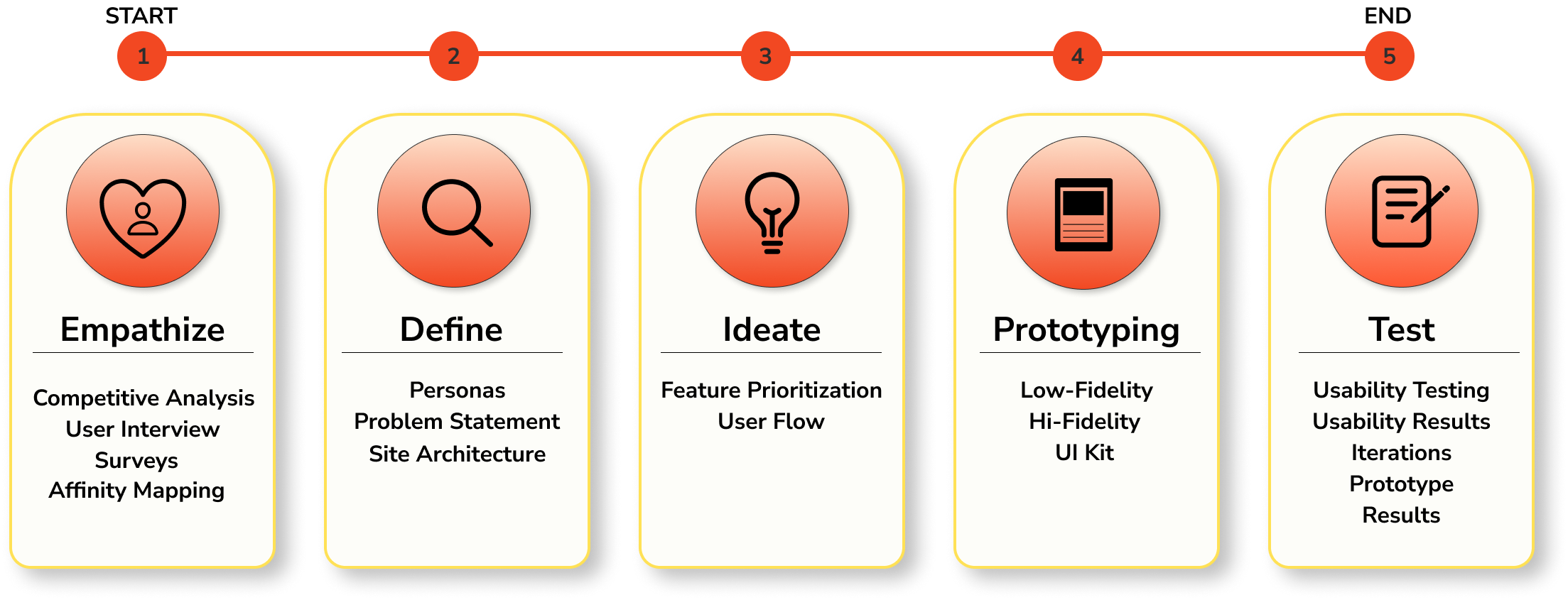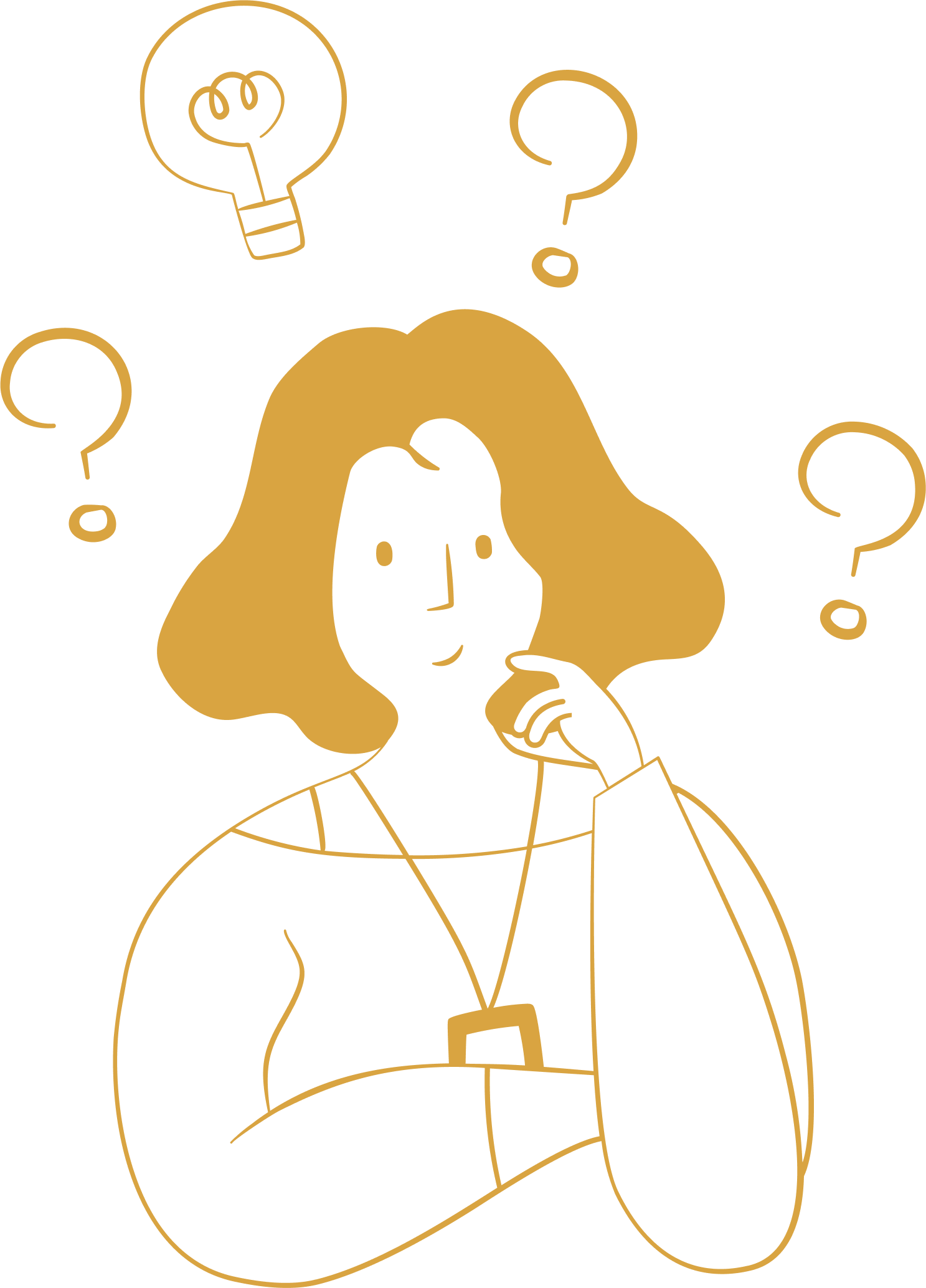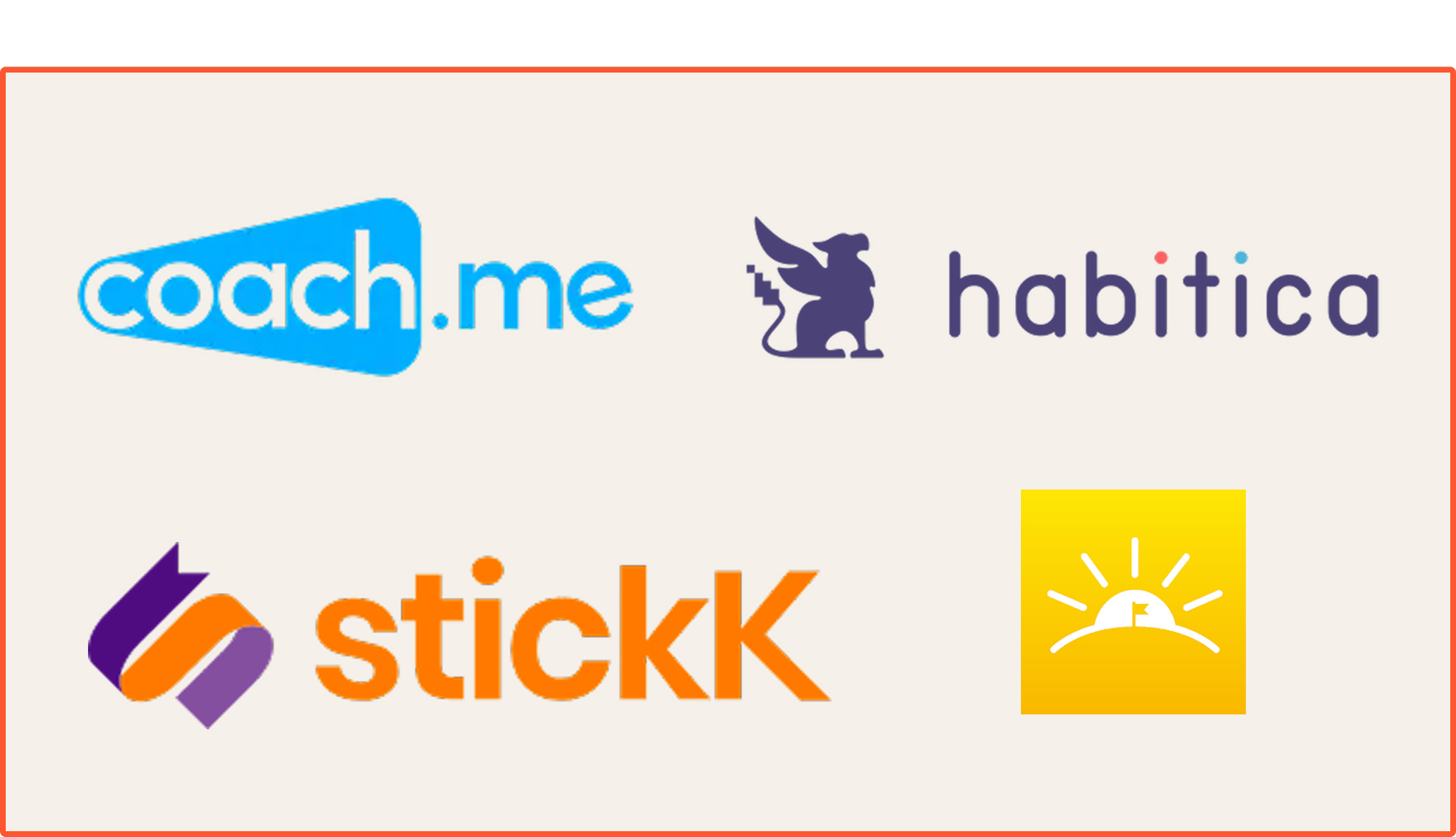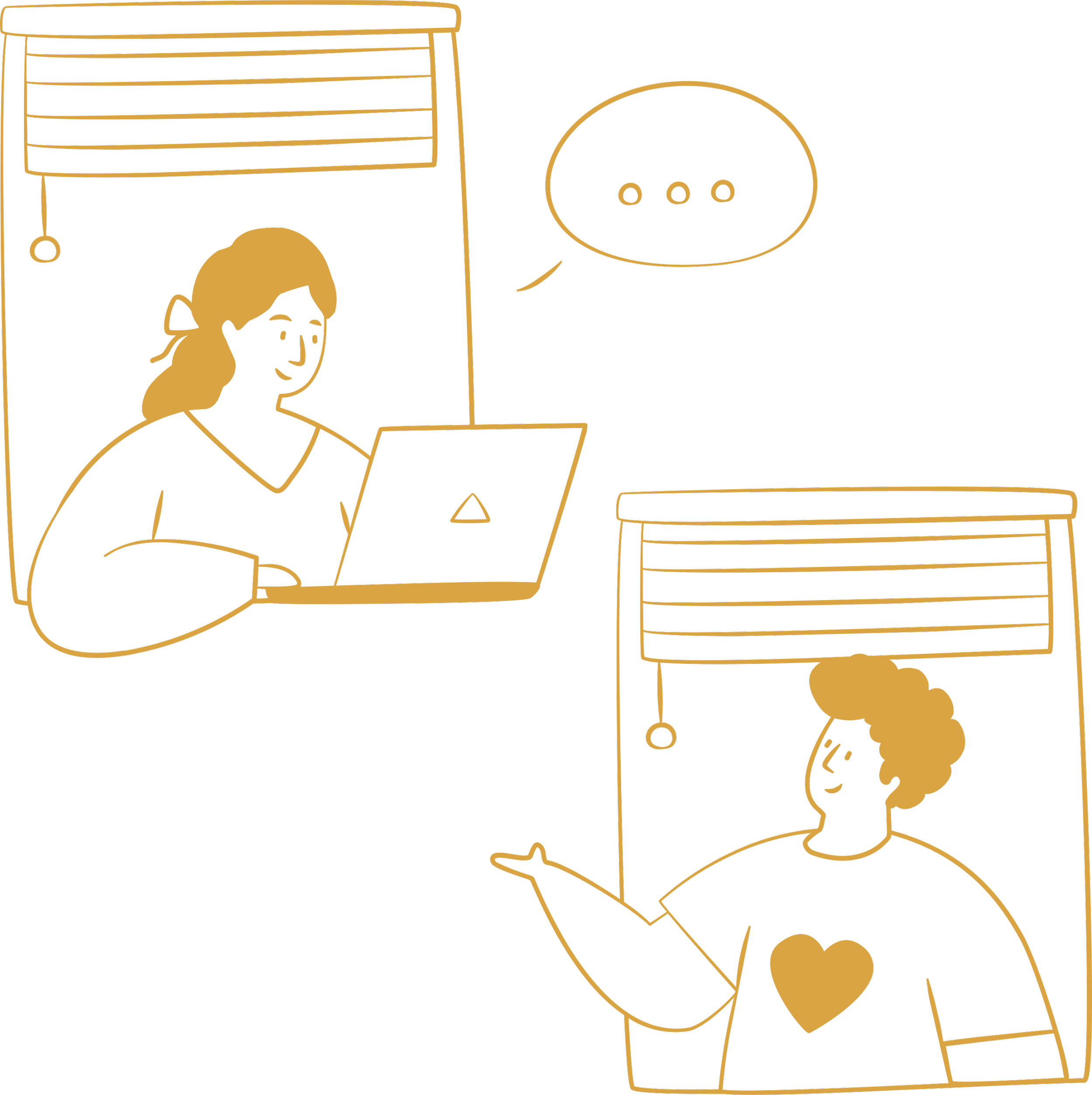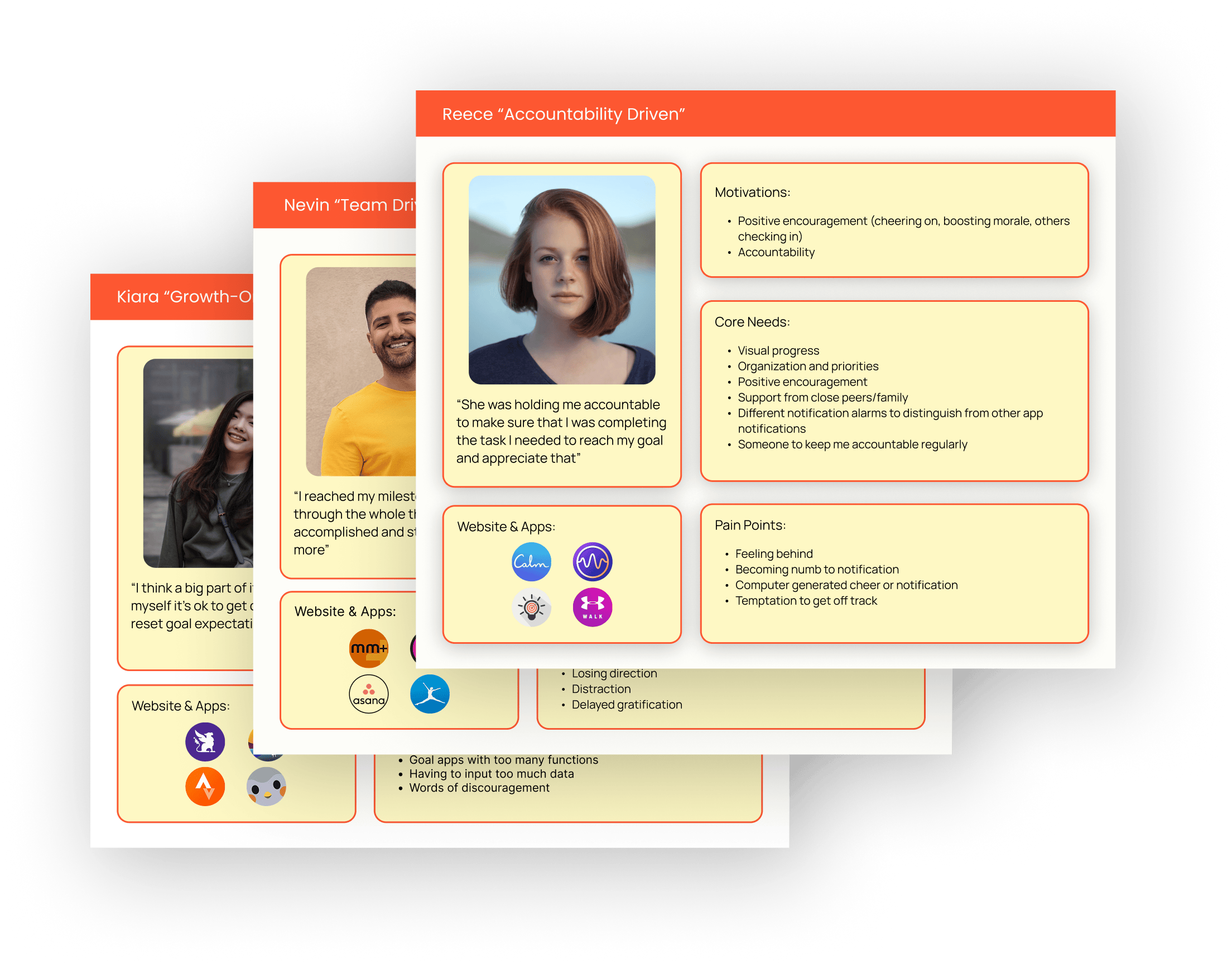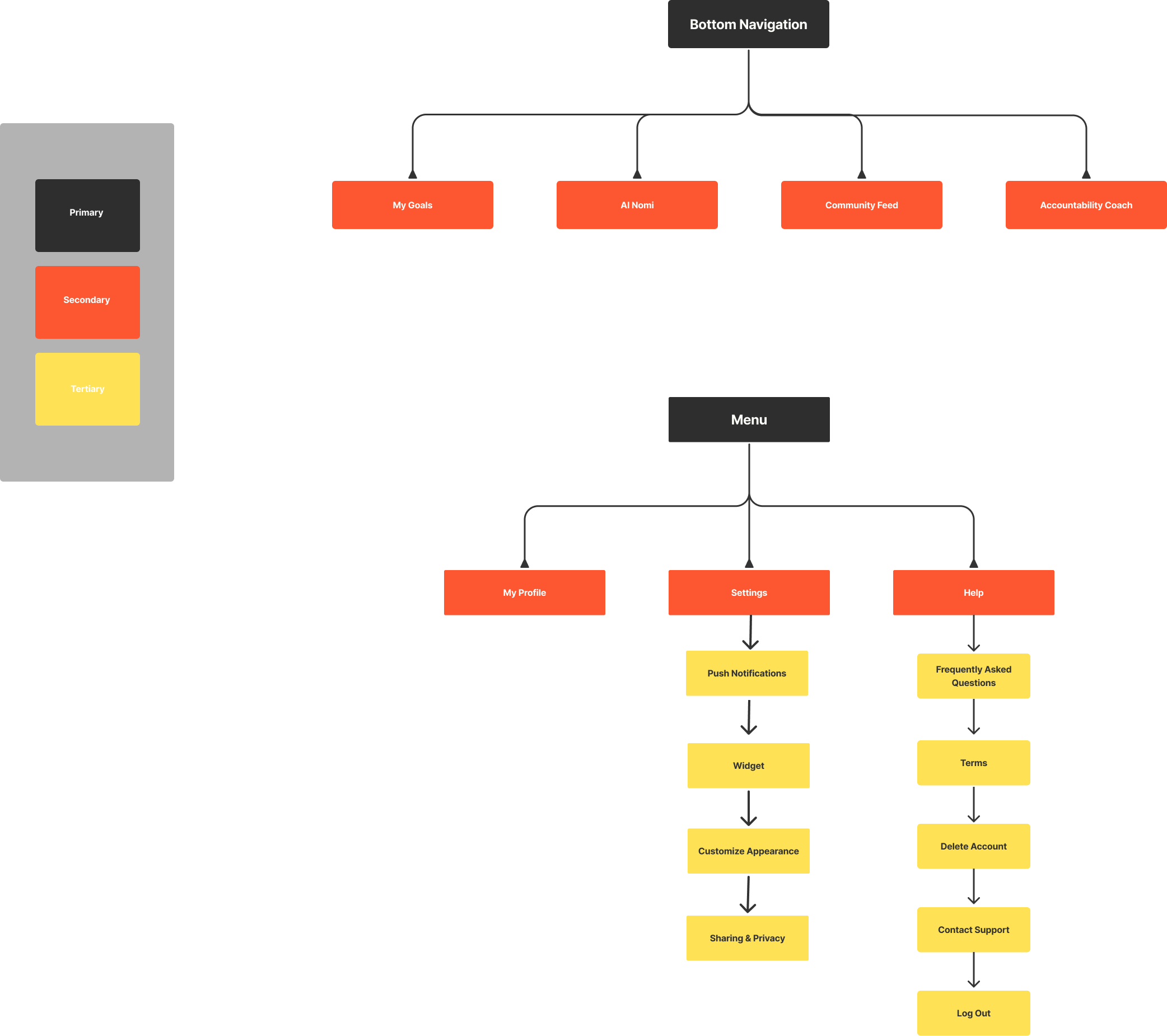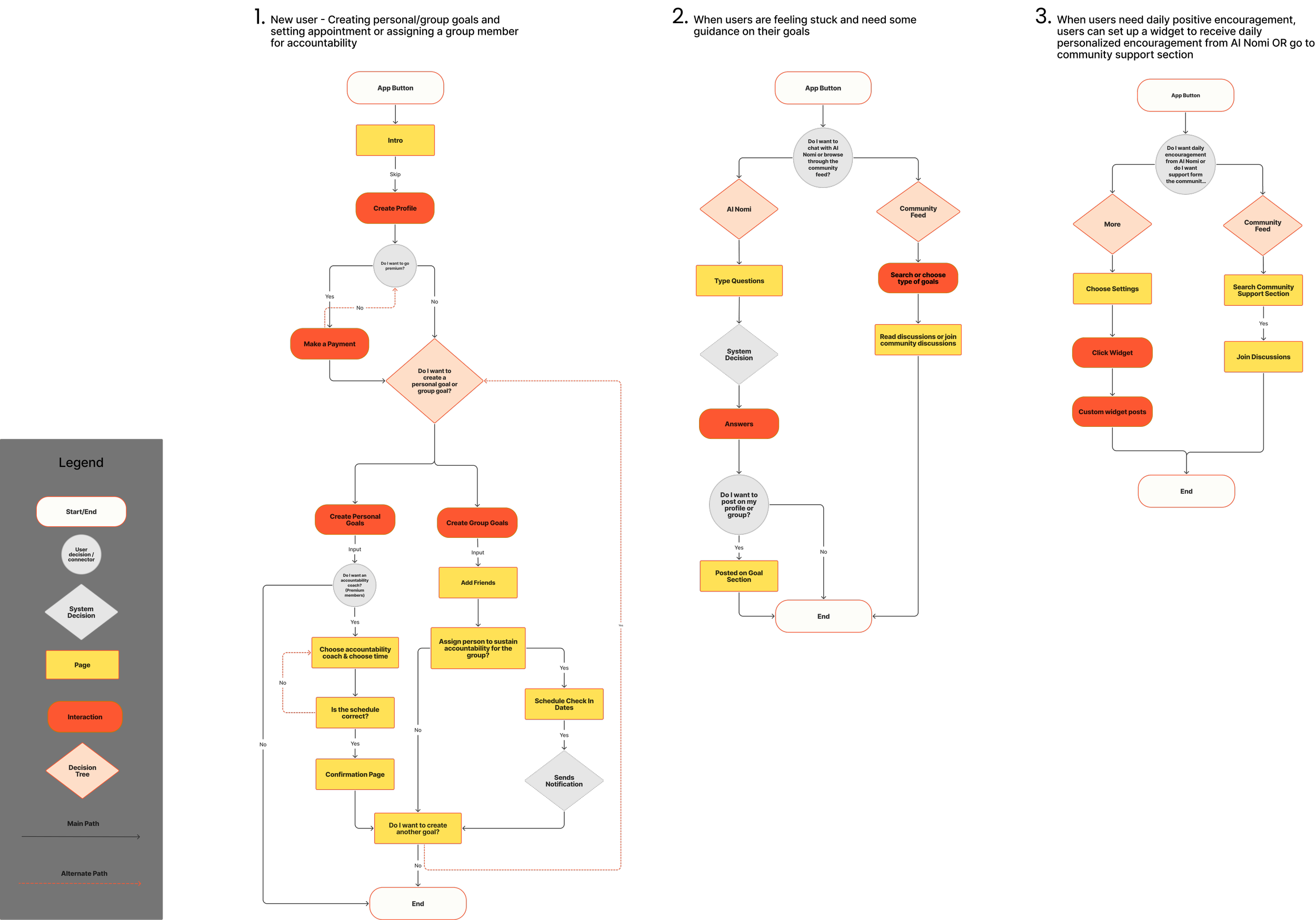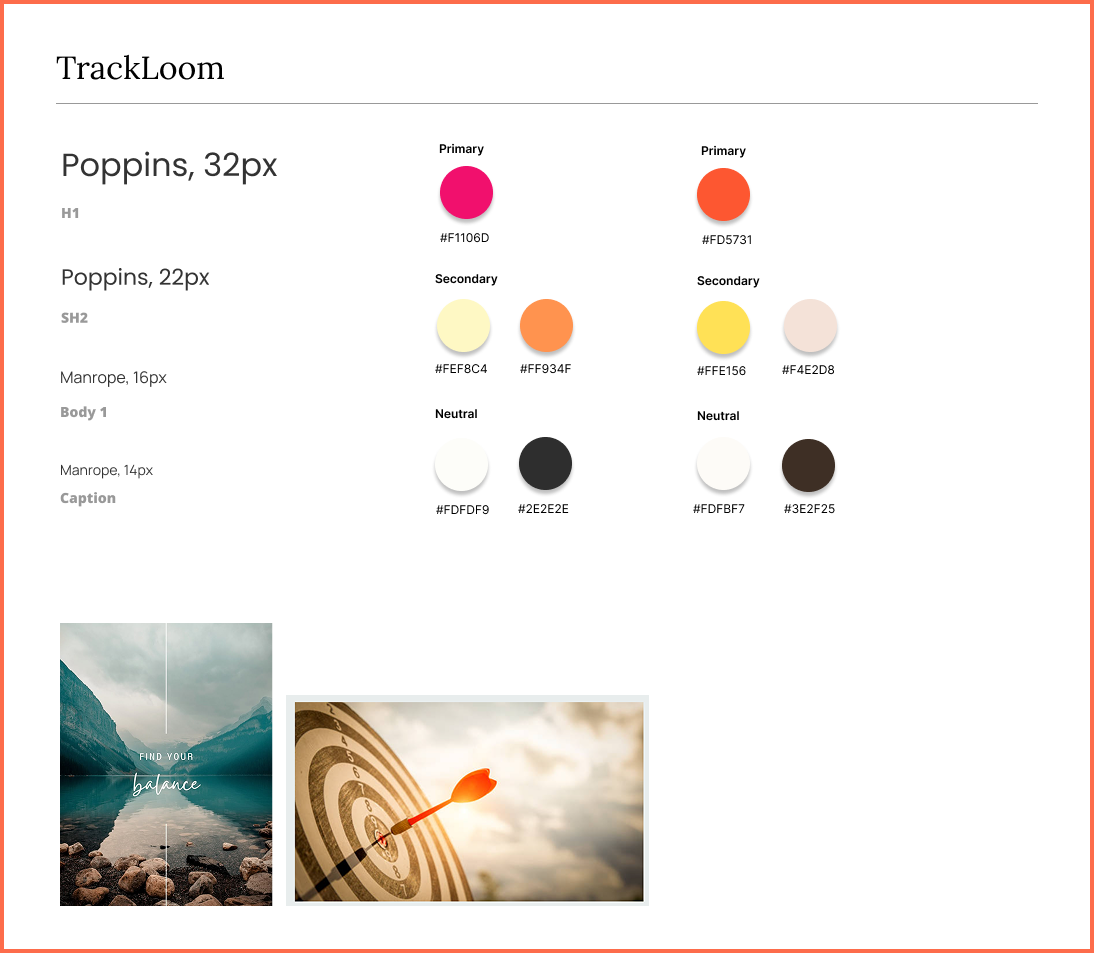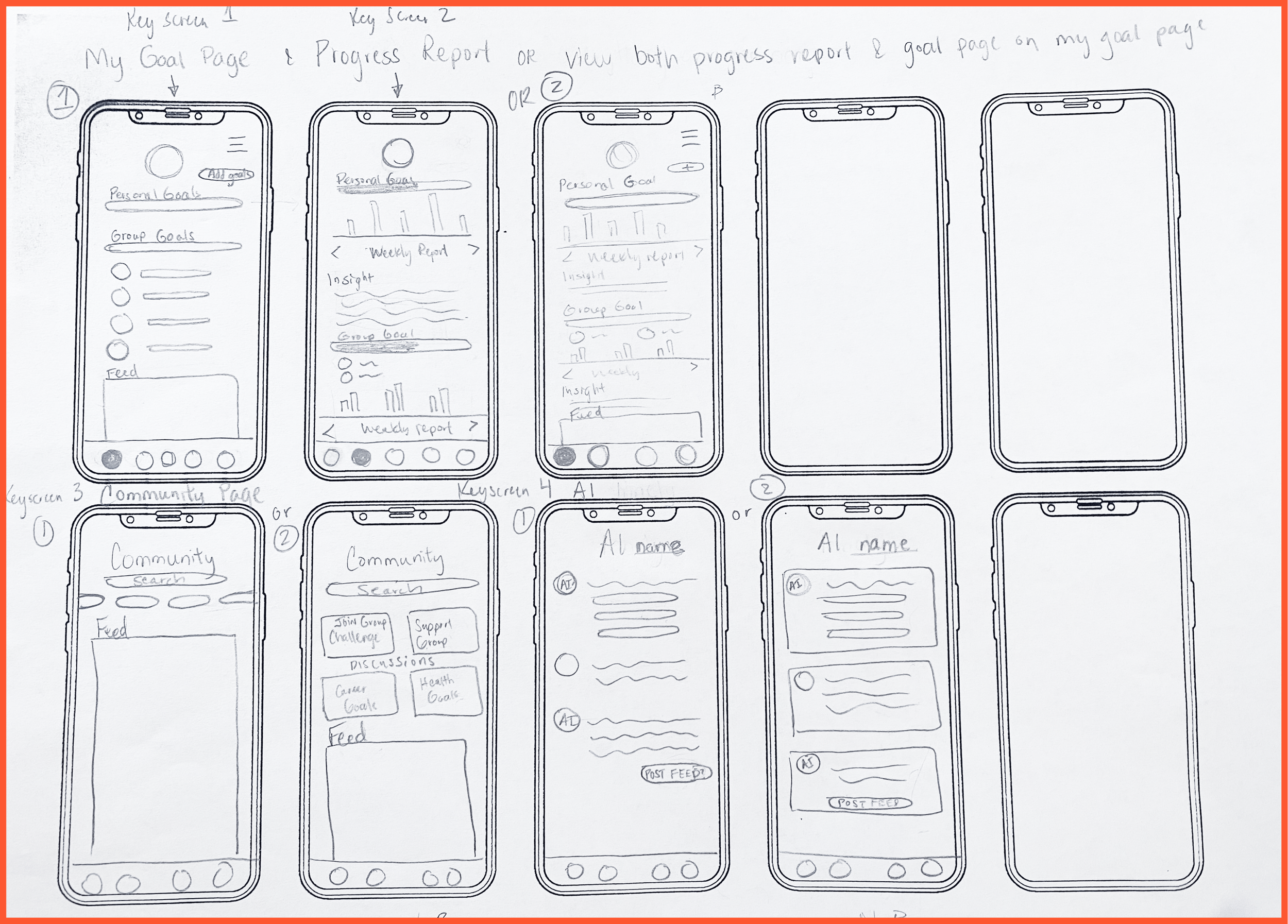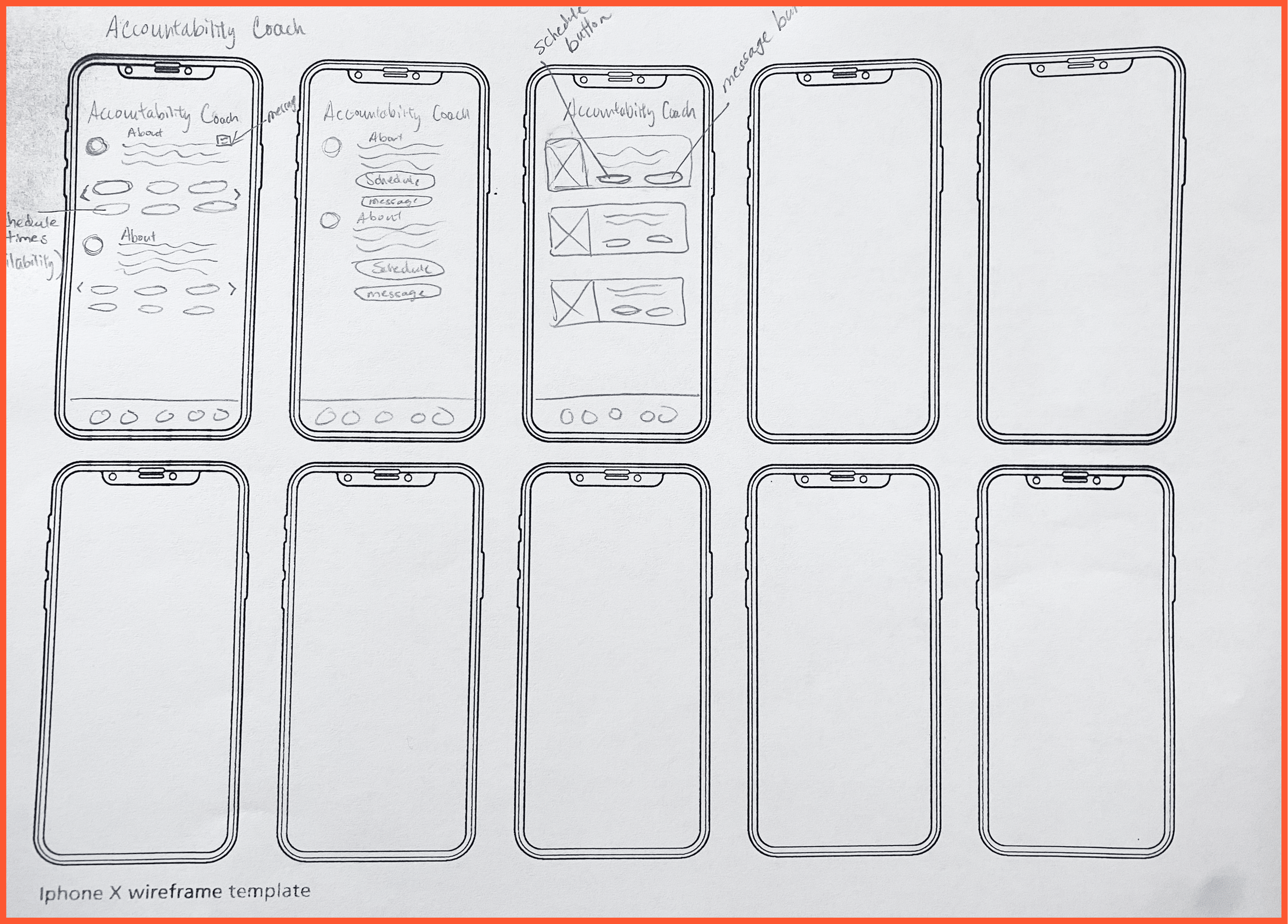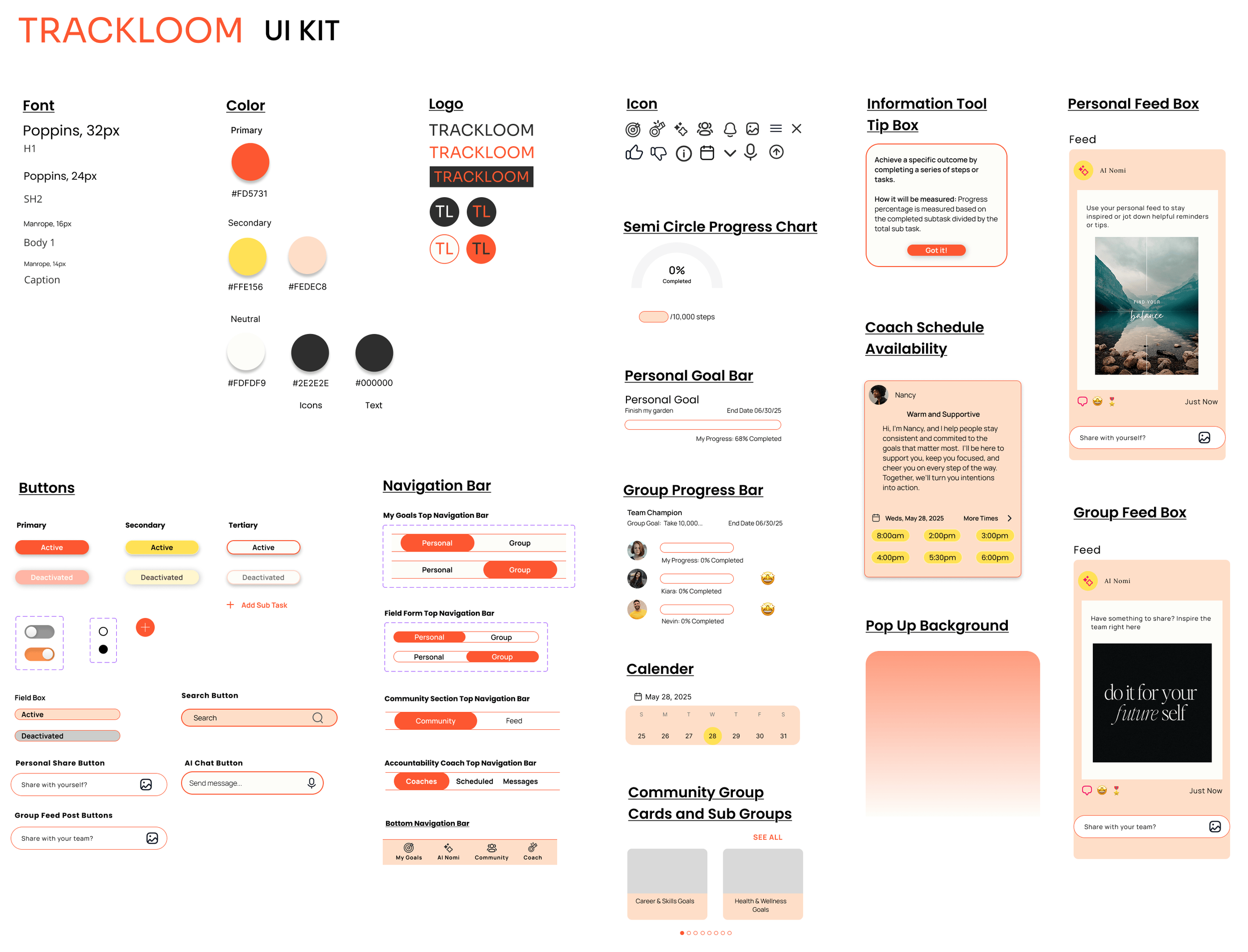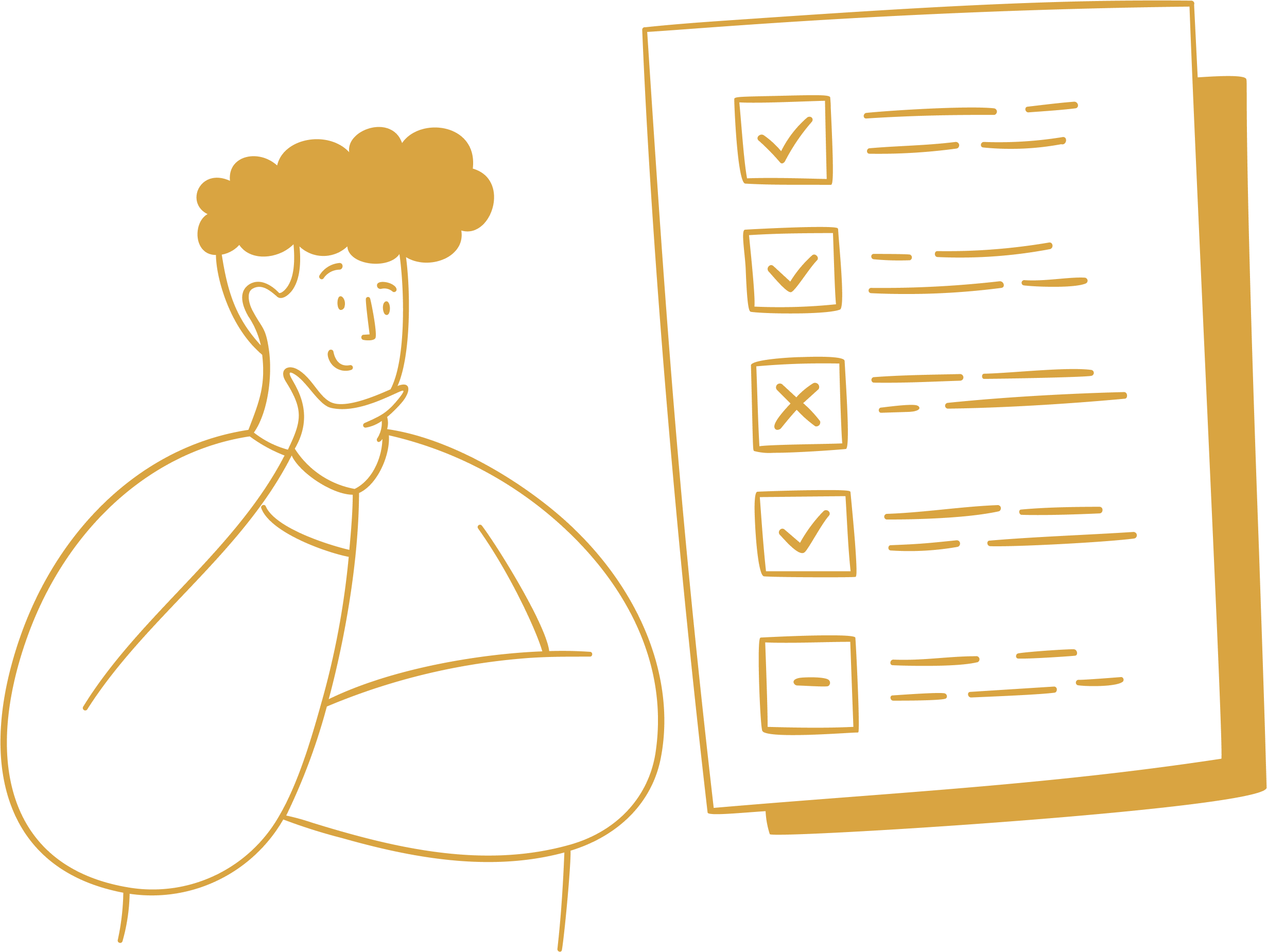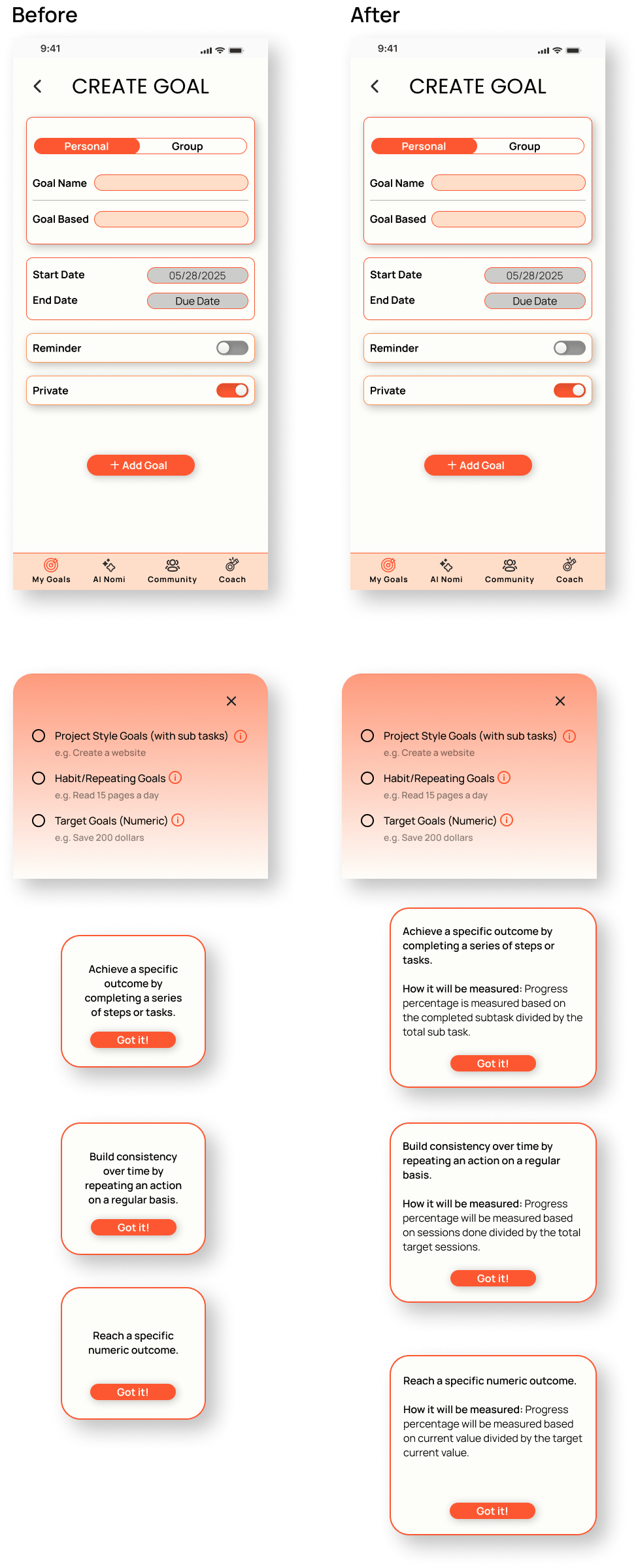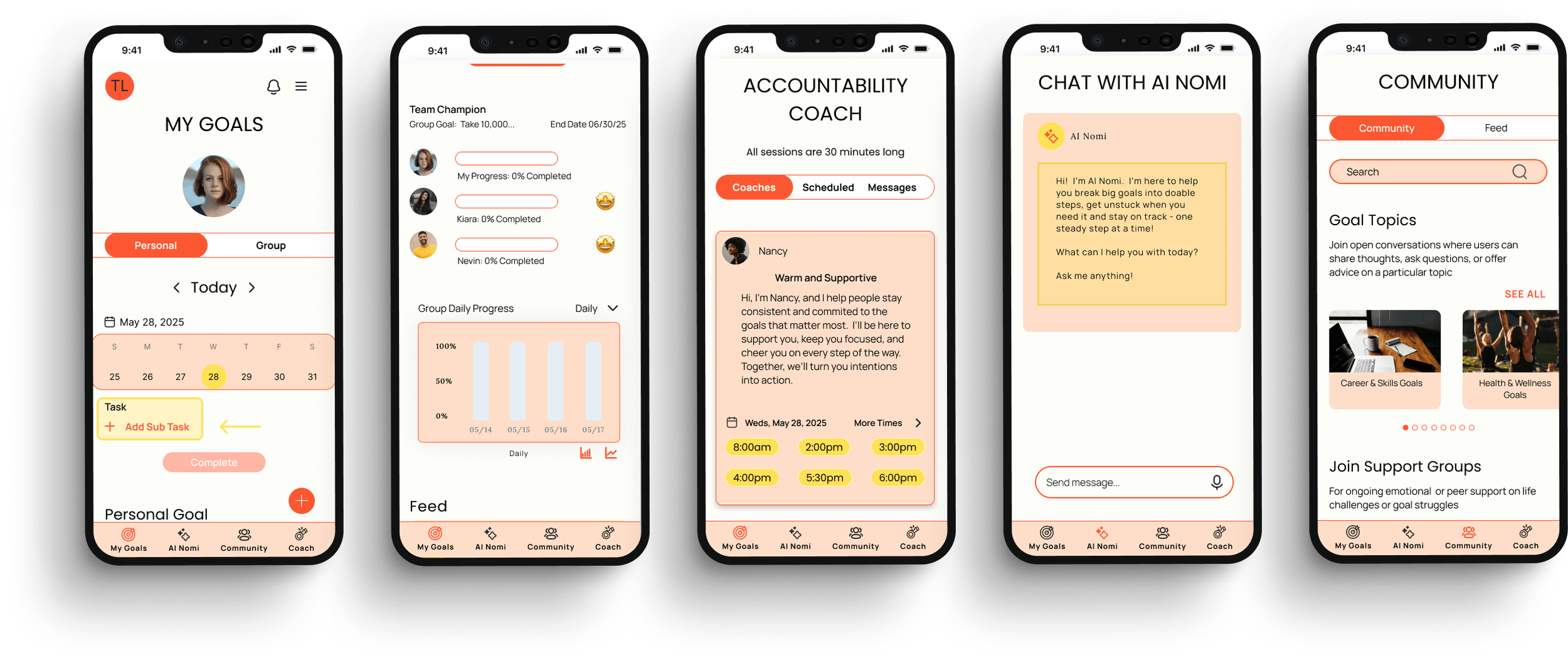TrackLoom
TrackLoom
Project: End to End Case Study, TrackLoom
Role: UX/UI Designer & Product Designer
Tools Used: Figma, FigJam
Duration: 5 Weeks
Introduction • About TrackLoom
TrackLoom
TrackLoom is a goal setting app that helps users reach their goals by giving users the right tools to help users succeed. TrackLoom emphasizes these core values: motivation, empowerment, connectedness, aspiration, and balance. Track means progress and to stay on course and Loom for weaving small parts into a whole.
Inspiration
I wanted to explore this specific area on goal setting since goals are so important to many people yet it seems that many of us have a hard time achieving it. Some of the benefits in reaching our goals gives us purpose, direction, boosts our self esteem, and confidence. We know that we need to reach our goal and we know the positive feelings that comes from reaching our goal so why is it so difficult for us and what do we need to help us achieve our goals?
This inspired me to explore this further to gain a better understanding of what drives people to reach their goals, in hopes of designing an app that help users achieve theirs.
Approach
Emphasize • To understand the user, their needs, and their problem
Focus
The goal was to explore what motivates people to reach their goals and to see what discourages or stops people from reaching their goals.
Objective
1. I want to know what helps/drive people to reach their goals.
2. I want to know what discourages people from reaching their goals and the frustrations people run into while trying to achieve their goals.
3. I want to know if having a support system helps in reaching their goals.
4. I need to discover what features from goal setting apps has helped or will help people to achieve their goals.
Research
After competitive analysis of CoachMe, Habitica, StickK, and GoalsWon, I discovered many of the websites provide a range of unique features such as
Offering incentives such as rewards and accountability from coaches or referee, flexible tracking system, habit forming by turning it into an enjoyable game, using a financial incentive for motivation, offering community support, or offering step by step plans.
A noticeable trend among these sites includes progress report, setting targets and reminders, ability to track goals, commitment journal or notes, ability to check in, and each app all have different techniques to hold the user accountable.
Depending on the goal app, they cater to either all ages or it is more geared towards specific range of age groups.
Competitive Analysis
User Interviews and Surveys
To gain a deeper understanding and to gain some insights of how users thrive in reaching their goals and to explore pain points in their journey towards reaching their goals, I carefully crafted interview questions to gather as much information as I can to see if there are any common themes.
Who Are Our Participants?
Adults with experience in learning how to bake and a range of age ranges (18 or older), ethnicities, genres.
5 participants were interviewed via zoom
4 participants completed a google survey
Affinity Mapping
After gathering all of the data from user interviews and surveys, I categorized the data using affinity mapping.
A visual progress, tracking to see what works best, and to visually see their priorities help
Influences on motivation or discouragement
Reminders were helpful if distinct from their daily notification and if receiving at a convenient time
Having the proper guidance to help them move towards their goals
Self talk such as breaking down goals and giving themselves grace
Other people holding them accountable encourages them to keep moving forward
Key Findings
Users are Driven By
Envision - see what their future or result can look like if they reach their goal, it can help encourage them when they start losing momentum.
Self Compassion - giving themselves grace
Incentives - from monetary incentive, rewards, achieving small goals leading to strive for more, or being around motivated people
Inspiration - when seeing others reach their goals, and positive encouragement
Features that Have Helped
Proper Guidance - having knowledge and having the proper steps to take help them move forward in reaching their goals
Visual Progress - having a visual to show progress, stats, tracking to decipher what works best, and to visually see their priorities can help with reaching their goals
Notifications - there were positive feelings about notifications if they receive it during a convenient time or if the notification/reminders are distinct from their daily activities
Support and Accountability
Support - encouragement, and help from friends, peers, and/or community have a positive impact
Accountability - other people holding them accountable, including holding themselves accountable, encourages them to keep going.
Roadblocks
Life Events - conflicts, distractions, lack of energy from work
Lost of Motivation - delayed gratification
Discouragement - negative reaction or feeling behind leads to discouragement
Define • Synthesizing research to define the problem…
Personas
After research, this led me to 3 personas to know who the target users will be to effectively design a goal setting app keeping these personas in mind.
Problem Statement
POV 1
I’d like to explore ways to help users who are driven by accountability, who find themselves having a difficult time achieving a goal on their own, to have easy access to find someone who will hold them accountable.
HMW 1
How might we design a solution to give access to users to find someone who will hold them accountable in reaching their goal?
POV 2
I’d like to explore ways to help users who are driven to work towards their goal from being in a group dynamic, who frequently find themselves feeling discouraged when feeling stuck, to have access to finding solutions.
HMW 2
How might we design a feature to give access for guidance and answers to when they run into a roadblock?
POV 3
I’d like to explore ways to help users who are driven by encouragement to reach their goals, who find themselves feeling discouraged when unexpected challenges or setbacks disrupts their plan, to have access to support and encouragement.
HMW 3
How might we design a solution to ensure users are receiving the support and encouragement they need?
Site Architecture
Ideate • Brainstorming and generating solutions to help those needs…
Feature Prioritization
By keeping the personas and the problem statement in mind, I prioritized these features thinking about which features will have the most impact and weighed the amount of effort it would take to incorporate each features. This allowed me to have a balanced approach to create a website that will have positive impact on users as well as completing this project within a specific time frame.
-
Account Creation - User registration, sign in, and account page so the user can access all their relevant and specific data such as previous purchases
Accountability Coach - Access to live coach to hold users accountable with the ability to choose to schedule weekly. Also provides steps and guidance personalize to your needs
Create a Group - Add friends/family to set a group goal or challenge and can also assign volunteer someone to be in charge of keeping the group accountable. This will also allow group members to support each other if needed
AI Nomi - AI for guidance for a particular goal, (ability to post in group thread) and for encouragement
Personal Goals - Personalize own goals. Includes option for privacy
Tracking - Visible Tracking
Customize Notification - Can custom notifications to choose the noise for when they are pinged. Can choose to receive text, email, and/or notification alerts
Milestones - AI Nomi can break down goals into smaller goals
Daily Widget- Can custom notifications to choose the noise for when they are pinged. Can choose how often they can receive notification alerts
Community - For challenges, support, and to meet people with similar goals, or simply just to make friends. Also includes live feed to see others progress if it’s not set to privacy
-
Monetary Reward - After creating a group, there can be a contract made between the members of the group and whoever reaches it first can win the prize the group agreed to
Reward - Earn coins for AI Nomi for every moment a milestone is reached to customize outfit, accessories, etc…Can use as their own avatar for their profile
-
Journal - To keep track of what worked and what didn’t to help users get closer to reaching their goals
-
Motivational Videos - Recordings from motivational speaker
User Flow
To understand how users will interact with the website, a user flow was created for the following to show the paths users will take when completing tasks:
Creating personal/group goals and setting an appointment with a personal coach or assigning a group member for accountability
When users are feeling stuck and need some guidance
When users need daily positive encouragement, users can set up a widget to receive daily personalized encouragement from AI Nomi or go to the community support section
Prototype • Create wireframes and prototypes to visualize solutions…
Branding
After understanding who my target users are from the user interviews, I brainstormed words that would define what this company would stand for.
The core values of TrackLoom are:
Motivation - to keep you moving forward
Empowerment - to guide you stay strong and confident
Aspiration - to help you strive for more
Connectedness - to provide support
Encouragement - to encourage with positivity
To represent these core values, two different color sets were chosen for the brand which I ultimately chose the orange set for the brand colors after receiving feedback from group crit in the UX Academy. Orange represents vibrancy, energy, optimism, and motivation.
To keep the logo modern, simple, and clean I decided to use the font Sora for the logo. I created a variety of logos that can be used across different platforms for adaptability for different use and legibility.
Lo Fidelity Sketches
Low fidelity frames were created by sketching different screens for each key unique screens.
2 different screens for the main goal page with progress report (to include both on one screen or have the main goal page and progress report on separate screens)
2 different screens for the community section page
2 different screens for the AI Nomi Chat page
3 different screens for the Accountability Coach section
High Fidelity
5 key screens were created to emphasize the importance of these features that fulfills the user personas:
Homepage
Group Page
Accountability Coach
Chat with AI Nomi
Community Section
UI Kit
Testing • Validate designs through user testing
Usability Test & Results
I conducted usability test via zoom involving 4 participants from the initial user interview and 1 new participant to complete 3 different key tasks. During this process, I made iterations whenever I discovered errors and continued testing with the remaining participants.
Task 1
Creating a personal goal to making an appointment with a coach to creating a group goal
Results:
All participants were able to quickly and easily navigate through the task The only minor error of the flow was the transition from completing the field form to adding subtasks to setting up an appointment with a coach.
After two participants were tested and I noticed the error, I made changes and tested the rest of the participants with the updated screen and there were no errors and it was easier to navigate and complete the task flow.
Task 2
Navigating to AI Nomi for guidance and posting the solution on the personal feed
Results:
All participants were able to complete the task quickly and easily by navigating to the bottom navigation bar to AI Nomi.
All participants were also able to easily find the CTA to post AI Nomi’s tips and guidance to their personal feed.
Task 3
Joining a support group that supports positive encouragement
Results:
All participants were able to complete the task quickly and easily by navigating to the community section. They found the positive encouragement group and were able to easily join
Side Test
2 options were given to see which phrase made the most sense for the type of goals to place in the field form
Result:
All participants found option 2 easier to understand but a few participants felt option 2 is still a bit unclear, even though they think option 2 was easier to understand than option 1. Participants also stated they liked the example underneath.
After the 4th participant, I decided to make those iterations by adding the choice to choose their goal type on the field form instead of having the goal base chosen for them to test the 5th participant.
This area needs further testing in the future
Iterations
Iterations were made based on usability test with 3 levels of priority.
Priority 1
During Testing Phase
“Goal Based” was changed to have a pop up menu of the list of style goals
Information tooltip was also added for additional information to help users understand which goal base they need to choose during the process of creating their goals
I also changed the brand colors after feedback from other UX academy students and for better contrast
After Testing
Added how each goal base will be measured for clarity in each info tooltip pop up
Priority 2
During Testing Phase
Highlighted sub task section and added an arrow so users know they need to add sub task in order to start measuring progress
Added spacing in the header area
Removed “Feed” button since each “personal” and “group” has it’s own feed if the user wanted to keep their personal feed private. It doesn’t make sense to have a feed button for a completely different screen
Priority 3
After Testing
Since participants can select target goals or habit/repeating goals for their goal of taking 10,000 steps daily, I included an additional field form screen for habit/repeating goals if they decided to take that route
I also added a section to name their group
High Fidelity After Iterations
After usability testing, solutions were incorporated to problems participants encountered during the task flows.
Prototype
The high fidelity prototype highlights the task flow of using the TrackLoom app:
Creating a personal goal, making an appointment with an accountability coach, then creating a group goal
The process of chatting with AI Nomi to get solutions and posting it on their feed on their main goal screen
Showing the process of joining a positive encouragement group under the community section.
Results
Next Steps
After making iterations during the usability testing phase, the next steps would be:
Add a section where users can assign one of their group members to hold the group accountable to help them reach their goal.
Further test the clarity of and understanding of how progress is measured and test the sub task section to ensure the flow goes as smoothly as possible.
Reflections
During the process of designing the TrackLoom End-To-End Project, I learned that it is not as simple as creating wire flows but it involves analyzing every detail in every design choice that was made. The most challenging part of this project was determining what information I needed from the user, how the app would measure a users goal and progress, and how users would easily understand which goal base they would choose. This project was more complex since TrackLoom is a general goal app that allows users to apply any goals they like. I had to narrow down the category of the type of goals users can select to measure their progress accurately. Every detail required careful design decisions to get the app to do what it is intended to do.

